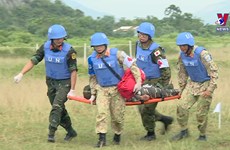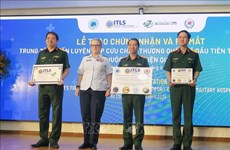MoH bolsters training for medical staff at grassroots level
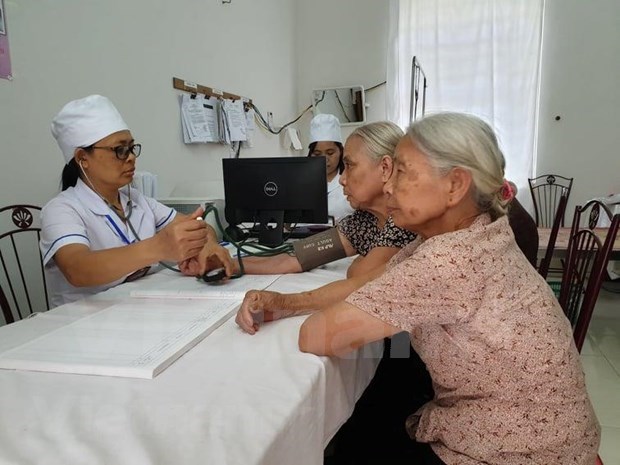 A doctor provides medical examination for people in a clinic in Thanh Thuy commune, Ha Nam district (Photo: VietnamPlus)
A doctor provides medical examination for people in a clinic in Thanh Thuy commune, Ha Nam district (Photo: VietnamPlus)
Hanoi (VNA) – Ensuring sufficient and sustainable finance for clinics at the commune level to provide health services in line with family medicine has an important role to play, said a health official.
Developing medical network at the grassroots level can be affirmed as an urgent need at present.
Vietnam is home to more than 11,000 clinics at the grassroots level; however, it takes time to improve the quality of medical treatment at those establishments.
Assoc. Prof. Phan Le Thu Hang, vice head of the financial planning office under the Ministry of Health (MoH), granted an interviewed to VietnamPlus on this issue.
Intensive reform in medical network at grassroots level
Reporter: Can you assess activity of pilot health clinics at grassroots level under the supervision of the MoH recently?
Assoc. Prof. Phan Le Thu Hang: Currently, it is urgent to develop a medical network in a new context. Therefore, the health sector is implementing a programme targeting intensive reforms in the network nationwide.
It is Project No.2348 on the development of a medical network at the grassroots level in the new context, which was approved by the Prime Minister. An important step of the health sector is to pilot a model to provide new health services at 26 health clinics of eight provinces.
The MoH has joined hands with the health departments of those provinces to carry out activities to operate the model. Firstly, the ministry has mobilized technical resources to conduct a survey which evaluates the situation at the 26 pilot health clinics.
Results of the survey showed that infrastructure, human resources and management skills of those clinics remain limited and have yet to meet the requirements of the new context, while there are bottlenecks in the financial mechanism. Those are challenges that the health sector needs to overcome in order to roll out a new model.
To create favourable conditions in health insurance payment
Reporter: What orientations does the MoH have at hand to address those problems?
Assoc. Prof. Phan Le Thu Hang: The health sector has devised a plan to improve infrastructure, particularly to upgrade the clinics and invest in medical equipment. Some devices had been brought to the communes for first time, such as one to test blood sugar at the health facilities.
Regarding human resources, the MoH has built a training programme for medical staff at the health clinics of those 26 communes. There are two noteworthy facts. Firstly, the programme is not for doctors only, but also for all staff. And secondly, for first time, there will be training courses on management skills for heads of the clinics.
In addition, the health sector will update and supplement technical guidance on providing health services in the new model, as well as the control of non-communicable diseases at the health clinics and community.
Notably, the MoH and health officials of the eight localities are working with health insurance agencies to create optimal conditions on health insurance payment at the clinics.
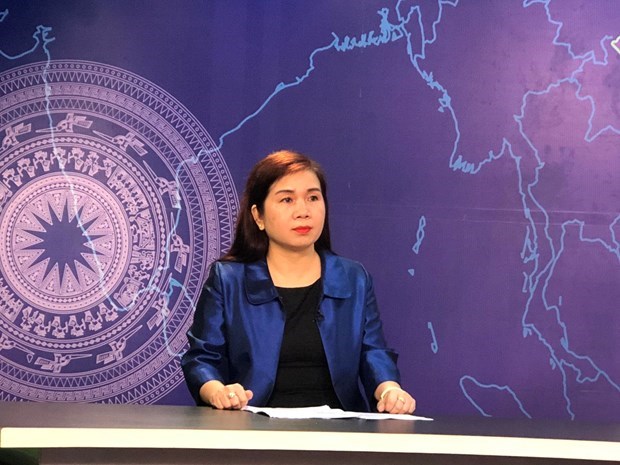 Assoc. Prof. Phan Le Thu Hang, vice head of the financial planning office under the MoH (Photo: VietnamPlus)
Assoc. Prof. Phan Le Thu Hang, vice head of the financial planning office under the MoH (Photo: VietnamPlus)However, it is necessary to understand that the transition of the medical system at the commune level will take time.
Reporter: What are measures taken by the MoH to improve the capacity of the health clinics at the commune level?
Assoc. Prof. Phan Le Thu Hang: In addition to infrastructure, due attention has been paid to human resources, as the MoH has devised a plan for the 26 pilot health clinics.
The plan is designed to develop medical staff meeting the requirements of the new health services model. Training courses have been arranged in the eight localities.
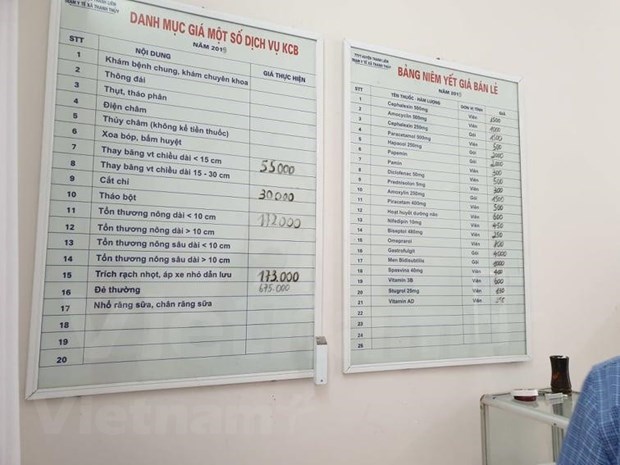 List of medical services provided at a communal health clinic (Photo: VietnamPlus)
List of medical services provided at a communal health clinic (Photo: VietnamPlus)Reporter: Are there any difficulties in finding budget for the implementation of the programme?
Assoc. Prof. Phan Le Thu Hang: To remove bottlenecks in finance, the MoH is calling for non-refundable assistance to support clinics in disadvantaged areas.
Furthermore, the ministry is working to mobilize local financial resources and teaming up with the health insurance agencies to address difficulties in the payment issue./.










